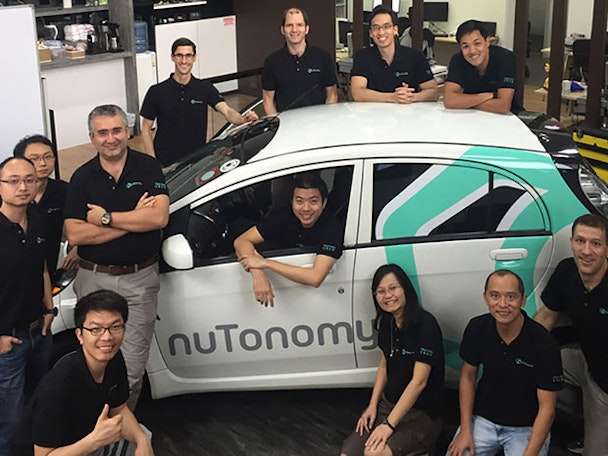Singapore set to lead the world with driverless taxis, with help from MIT
Hard on the heels of the Drum’s launch in Singapore last week, comes the news that the dynamic island nation may have another coup up its sleeve: it could be first city in the world with a fleet of driverless taxis.

Some of the nuTonomy team at MIT
The startup nuTonomy Inc - based in Cambridge, Mass and Singapore - has revealed that it raised $16m to continue work on its autonomous vehicle technology.
The man behind it all is Karl Iagnemma who grew up in Detroit where many of his family members worked in the auto industry.
Iagnemma was an intern at General Motors for three summers, a position that provided him a partial scholarship to the University of Michigan, where he graduated first in his class with a degree in engineering.
“Cars have always been part of my DNA,” said Iagnemma,
The funding for the Singapore venture was led by Highland Capital Partners LLC with additional capital from Signal Ventures and Fontinalis Partners, the investment firm started by William C. Ford, executive chairman of the Ford Motor Co.
Another important backer is the corporate investment arm of the government of Singapore.
The Boston Globe declared. “nuTonomy is vying to operate the first fleet of self-driving vehicles in the world.”
The company said it is currently testing vehicles there now and hopes to have a fleet of self-driving taxis in service in 2018.
NuTomony said it is designing a package of products that can operate an entire fleet of vehicles, from the app that hails the ride, to software that controls the vehicles remotely, dispatching them on routes and navigating among traffic on local streets.
The company was spun out of MIT, where Iagnemma is director of the Robotic Mobility Group at the school and Emilio Frazzoli, the company’s cofounder and chief technology officer, a professor of aeronautics and astronautics.
Iagnemma said the school has a research and technology partnership with Singapore that helped the startup gain coveted testing ground in the Asian country.
The Singapore government, Iagnemma said, has historically encouraged transportation innovation as it aims to minimize congestion in a tiny island nation that is about 31 miles at its widest.
Iagnemma noted the field is crowded with small startups and corporate giants alike. His former employer, GM, recently acquired nuTonomy competitor Cruise Automation, reportedly for upwards of $1bn.
“This is a multi trillion-dollar opportunity,” he said. “It really is something of a race to get to a good technical solution quickly.”
NuTonomy’s software is currently tested on Mitsubishi iMiev electric cars, and the company has a deal with French automaker Renault to provide even more research and development vehicles.
Using your phone in Singapore, you'll call a self-driving car to you, tell it your destination, and then sit back and let the car drive you there. This would be a massive advance for both autonomous cars and urban mobility.
nuTonomy launched in 2013, was based on robotics research at MIT that goes back almost a decade. Karl Iagnemma and Emilio Frazzoli, nuTonomy's CEO and CTO, both directed mobility-focused robotics labs from MIT, and most recently, Frazzoli was part of an MIT experiment in Singapore which set up autonomous golf carts to ferry tourists around a park for a week.
Singapore and MIT have been collaborating on research projects like these since 2007, and nuTonomy is one of the results of this partnership: part of nuTonomy's 25-member core team comes directly from the team that developed those autonomous golf carts.
The Singapore-MIT Alliance for Research and Technology (SMART) is a major research enterprise established by the Massachusetts Institute of Technology (MIT) in partnership with the National Research Foundation of Singapore (NRF) in 2007.
SMART is MIT's first, and to-date only, research centre outside the United States. It is also MIT's largest international research programme.
When we say "fully autonomous," we're talking about Level 4 autonomy, or full self-driving automation, says the Globe. A Level 4 autonomous vehicle "is designed to perform all safety-critical driving functions and monitor roadway conditions for an entire trip;" all you have to do is provide a destination and (possibly) open and shut the doors. Most cars with functional autonomy right now, in contrast, are at Level 3, with limited self-driving automation, the car is capable of driving itself with no human inside, which is what makes a robotic taxi service possible.

